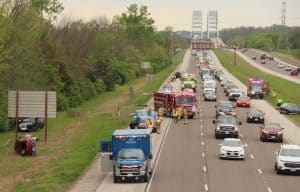Splash pad talks boil over
A contentious discussion on the long-awaited splash pad project during last Wednesday’s meeting of the Waterloo Park Board ended with the board deciding to appoint a committee for the project as it seeks to reorganize going forward.
Prior to official discussion of the project during the meeting, Waterloo Park Board President Shelby Mathes presented to the board correspondence he had sent requesting an extension for the Open Space Lands Acquisition and Development grant for the splash pad.
As previously reported, Mathes said Waterloo Mayor Tom Smith had reached out to State Rep. David Friess (R-Red Bud) for assistance in securing the extension, which comes from the Illinois Department of Natural Resources and would provide a total of $400,000 for the project.
To receive the full amount of the grant, the park board must effectively complete splash pad construction by this June. The extension would set the new deadline for making this project at June 20, 2024.
“We got back that they have considered and offered it to us,” Mathes said. “I’ve signed the paper last Friday, and (park district attorney) Mary (Buettner) scanned it back to them. Waiting for their signatures. Once we get their signatures, then we definitely know that we can move forward.”
Mathes later opened discussions on the splash pad explaining his perspective on a recent meeting between himself, Waterloo mayoral candidate Stan Darter, Waterloo Citizens for a Pool President Amy Grandcolas and the William Zimmer Foundation.
The meeting was organized as the Zimmer Foundation had previously expressed an interest in offering a $400,000 donation toward the project but later discovered that it could not donate to the park district – a taxing governmental body – directly.
A topic of discussion at several park board meetings over the last few months has been the possibility of setting up a pass-through whereby Waterloo Citizens for a Pool – as a 501(c)(3) organization – would accept these funds from the Zimmer Foundation and pass them along to the park board.
As Mathes explained it, he had been told the Zimmer Foundation was not interested in conducting a pass-through with an organization not directly related with the park board.
“We got there, and they will not do a pass-through through other entities,” Mathes said. “If we, the park district, get a group of people to form Citizens for Waterloo Park District or Friends of the Waterloo Park District, they will do a pass-through. I was told that by one of the members of the committee.”
Darter, who had been involved in potential pass-through discussions in the month prior to the meeting, contested Mathes’ recounting of the meeting.
Darter said he and Grandcolas had presented to the Zimmer board and spoken hopefully about the project, only for Mathes to say to the board that he wouldn’t be approving the pass-through as previously discussed.
“What I said in the meeting was that we both spoke positively of it, and you said that you are not going to vote for it, and you are not gonna recommend it,” Darter said.
Mathes explained that his reason for speaking against the pass-through was that he didn’t want to demand JP Fitzgibbons – the possible builder of the splash pad – accept a deal that would only give him until this June to complete the project.
Mathes noted that such a short deadline coupled with uncertain weather could see tax dollars wasted and Fitzgibbons’ reputation hurt as they failed to finish the splash pad in time.
“I said that I couldn’t go with this because we had no guarantee that it could be completed,” Mathes said.
Mathes further said that, following the meeting with the Zimmer board, he had been told by a member of the board that they would not be willing to go forward with the pass-through with WCP.
Darter argued that Mathes neglected to discuss his plans for the meeting with Grandcolas and himself.
From there, discussions at the meeting moved to the possibility of a Friends of the Waterloo Park District 501(c)(3) being established in order to accept Zimmer funds in time before the OSLAD deadline next year.
Park board commissioner Michael Nolte said he had been looking into the logistics of setting up such an organization.
The process, he said, would need to start with establishing articles of incorporation for the group and finding a minimum of three directors. As those and the group’s bylaws could be approved within four weeks, the application for 501(c)(3) status would then require a $600 filing fee and would likely take three to six months, though it could potentially take up to 12 months.
While not officially approved, it was said at the meeting that Buettner or whomever becomes directors of the organization could start developing the articles of incorporation.
Park board treasurer Julie Bradley voiced her concern that the Zimmer Foundation might not be interested in conducting a pass-through involving any 501(c)(3) organization, and the park board ought to confirm its willingness before pushing forward to organize such a group.
Darter also suggested there could be a potential conflict of interest in the park board putting together a 501(c)(3).
He explained that an independent group coming together in support of a specific cause, such as WCP, is different from a government organization like the park board putting such a group together.
In the latter half of splash pad conversations, park board commissioner Gina Pfund questioned whether or not the board should move forward given previously discussed uncertainties about the splash pad’s design.
Specifically, discussion during last month’s park board meeting had revealed there is currently no concrete water buffer around the perimeter of the smaller and cheaper design the park board might have to go with should they not receive the Zimmer funds.
Pfund’s concern prompted a larger discussion about troubles regarding splash pad design.
Several ideas were suggested through the conversation, including adjusting various aspects of the design and repositioning the splash pad, though that raised several questions about placement of a possible future pool and the overall visibility of the splash pad.
It was also suggested that, should the Zimmer Foundation not make the donation to the park district, the board could levy for additional required funds.
During the design talks, discussion turned to HMG Engineers, who have been serving as general contractors for the park district on this project.
Nolte said the currently troubled status of the designs were largely due to early miscommunications between members of the park board and HMG, and the involvement of another group to help finalize the designs could be necessary.
“We kept going back to them without having a final idea of what we wanted as a group,” Nolte said. “We used up all of the engineering funds. We may have to outlay a little bit.”
Nolte went on to say HMG hasn’t offered the support for the project that the board originally expected. He noted a lack of certainty from HMG in regard to health and safety standards for the splash pad, specifically the previously mentioned concrete skirt around the smaller design.
“I think we speculate a little bit too much,” Nolte said. “We elected not to general contract this ourselves, to go with HMG, and HMG hasn’t been providing the proper engineering support to this project. If we have a question about something being approved by the Department of Public Health or needing a new permit, our general contractor should be able to answer that, and if they answered incorrectly, they should be held to account for that. They’re not providing that support.”
A brief altercation occurred wherein Mathes intimated that part of the miscommunication problems with HMG were due to Nolte’s inability to respond in a timely manner during the day because of his job – Nolte and Mathes went through their text message history to determine when specifically Nolte had failed to respond to a question from Shelby.
Several individuals present at the meeting, including park district superintendent Don Prater, suggested a special committee be formed to serve as the point of communication with HMG in order to finalize designs for the project.
“All we’ve done is spend $135,000 with HMG, and here we are, sitting here,” Prater said. “We’ve got all kinds of plans, but we don’t have any money, and we’re just so disorganized all of a sudden. This is nuts. Everybody’s trying to run behind each other’s back. Put a couple guys in charge … Let the two people that’s running run it. That’s the only way we’re gonna get this thing done in a length of time.”
Ultimately, the board approved a motion to table the splash pad discussion until the OSLAD grant extension had been confirmed. Nolte and park board vice president Keith Buettner were also appointed to serve as the committee overseeing the project going forward.
Toward the end of the meeting, the board also discussed wage adjustments for those involved in the district, including raises for maintenance workers, Prater and Bradley.
During his report, Prater also spoke about several instances of turf being trimmed and stolen from inside the shed at the dog park which he and Mathes would be looking into further.
Also at the park board meeting, Girl Scout Troop 387 leader Cara Kettler requested permission to use Konarcik Park for a day camp as they did last year, with several members of the board noting how successful the event was previously.






